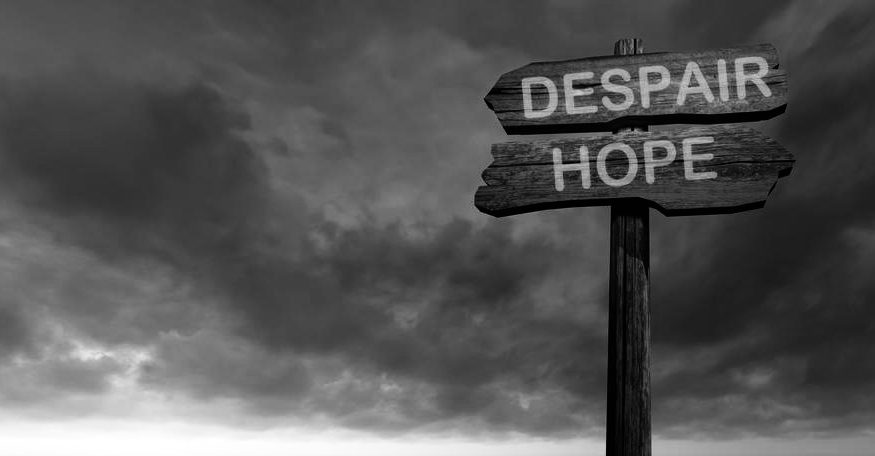On Hope and Despair (Part I)
29 April 2024
In today’s world, it is not difficult to find something to despair about: Climate change, mass shootings, wars, reproductive rights, racism, social and economic inequality, and politics, just to name a few examples. And many people do in fact despair over these issues. One reason why despair can be such a psychologically and physically painful experience is that it involves a loss of hope, especially when what is lost is integral to our identities or life plans. The more important the hope is to us, the more devastated and incapacitated we feel when we lose it. Despair in general is bad for us and has been linked to various mental health issues like anxiety, loneliness and depression, and to destructive behaviors such as alcoholism and suicide.
What can we do to overcome despair? Nearly everyone thinks that the remedy is to recover hope; after all, if despair signals a loss or absence of hope, the way out must be to somehow find hope again. Philosopher Jakob Huber, for example, thinks that despair can actually be harnessed to give rise to more realistic hopes, while philosopher Katie Stockdale proposes that despair, in the context of the emotion as felt by members of oppressed groups, can pave the way for a collective hope to emerge.
Both of these proposals assume that hope and despair are opposites: If a person is despairing over something, they cannot be hoping for it at the same time, and vice versa. This assumption is intuitive and enjoys near universal consensus among philosophers and hope theorists. But I think it is false, or only partly right. This is because I think people can hope for things about which they simultaneously despair. To illustrate this, consider the following scenarios.
Scenario 1: Suppose you find out in class that there is going to be a surprise quiz. You have fallen behind in the course and feel utterly unprepared. All you can do now is cross your fingers and hope to pass. Despite hoping to pass the quiz, you nevertheless don’t feel good about your chances of doing so: “I hope to pass this pop quiz but I just don’t feel hopeful that I will. Let’s see what happens”.
Scenario 2: Suppose you decide to run a marathon. You have always wanted to run one and think now is as good a time as any to start doing something about it. You are well aware that marathon training will be physically and mentally grueling. Although you have always had a hard time with physical activities, you are prepared to give marathon training a shot and hope to run in an actual race. When a friend asks you whether you are hopeful that you will complete the race, you respond: “I don’t know whether I am hopeful. I suppose I will have a better idea once I start my training. Let’s see how that goes first!”
In both scenarios, you hope for a particular outcome; that is, you desire some specific outcome and believe that it has some (i.e., non-zero) chance of happening. In both scenarios, you have made a perfectly coherent and reasonable statement about how you feel about the chances that your hope will come true.
If these observations are right, then what these scenarios reveal is that hoping is a distinct mental phenomenon from being hopeful. It is one thing to hope for a particular outcome but another to be hopeful about its chances of happening. Because hoping and hopefulness are distinct, a person can therefore experience one without necessarily experiencing the other. That is why you can, in the first scenario, hope for an outcome that you despair about (i.e., you don’t feel hopeful about it) and in the second, you hope for an outcome without being either hopeful or unhopeful. As we can see, hopefulness is neither a prerequisite nor a necessary condition for hoping.
Let us now revisit the above assumption that hope and despair are opposites in light of this distinction. Is hope opposed to despair? Answer: It depends on what you mean by ‘hope’. If the word refers to hopefulness, then despair is, as hope theorists have claimed, opposed to hope in that one cannot despair and be hopeful at the same time. But if the word refers to the mental attitude of hoping, then despair and hope are not in fact opposites but compatible phenomena.
Far from being academic or pedantic, this distinction between hoping and hopefulness has vast implications about what it is to hope, what it is to lose hope and what it takes to recover hope, topics that I will have more to say in the next post. In my view, the very idea that a person can hope for an outcome that they simultaneously despair about – that is, they can hope without hope – actually carves out a new psychological space for people to occupy whenever they find themselves hoping under dire circumstances. This is a space that would otherwise be unavailable if we failed to distinguish the two senses of hope, for we would then be stuck only with the options of either hoping or despairing. Pick any issue in the first sentence of this post and think about the relevant outcome that you desire but which you also perceive to have a minimal chance of obtaining. Just because you are not hopeful about it, that fact alone does not necessitate that you must give up hoping for it. Indeed, you can continue to hope for it while being unhopeful. And for some people, it is critical and essential to their wellbeing that they are able to do so. This is because what we hope for is part and parcel of who we are as persons, and reveals our morals, values, character, identity, etc. Thus, we may despair that racism is still rampant today and will remain so during our lifetime. Nevertheless, we still view it as important, for the sake of others, especially our children and loved ones, to continue to hope that racism will one day be eradicated because this hope figures centrally in our vision of how the world ought to be.
- December 2024
- November 2024
- October 2024
- September 2024
- August 2024
- July 2024
- June 2024
- May 2024
- April 2024
- March 2024
- February 2024
- January 2024
- December 2023
- November 2023
- October 2023
- September 2023
- August 2023
- July 2023
- June 2023
- May 2023
- April 2023
- March 2023
- February 2023
- January 2023
- December 2022
- November 2022
- October 2022
- September 2022
- August 2022
- July 2022
- June 2022
- May 2022
- April 2022
- March 2022
- February 2022
- January 2022
- December 2021
- November 2021
- October 2021
- September 2021
- August 2021
- July 2021
- June 2021
- May 2021
- April 2021
- March 2021
- February 2021
- January 2021
- December 2020
- November 2020
- October 2020
- September 2020
- August 2020
- July 2020
- June 2020
- May 2020
- April 2020
- March 2020
- February 2020
- January 2020
- December 2019
- November 2019
- October 2019
- September 2019
- August 2019
- July 2019
- June 2019
- May 2019
- April 2019
- March 2019
- February 2019
- January 2019
- December 2018
- November 2018
- October 2018
- September 2018
- August 2018
- July 2018
- June 2018
- May 2018
- April 2018
- March 2018
- February 2018
- January 2018
- December 2017
- November 2017
- October 2017
- September 2017
- August 2017
- July 2017
- June 2017
- May 2017

